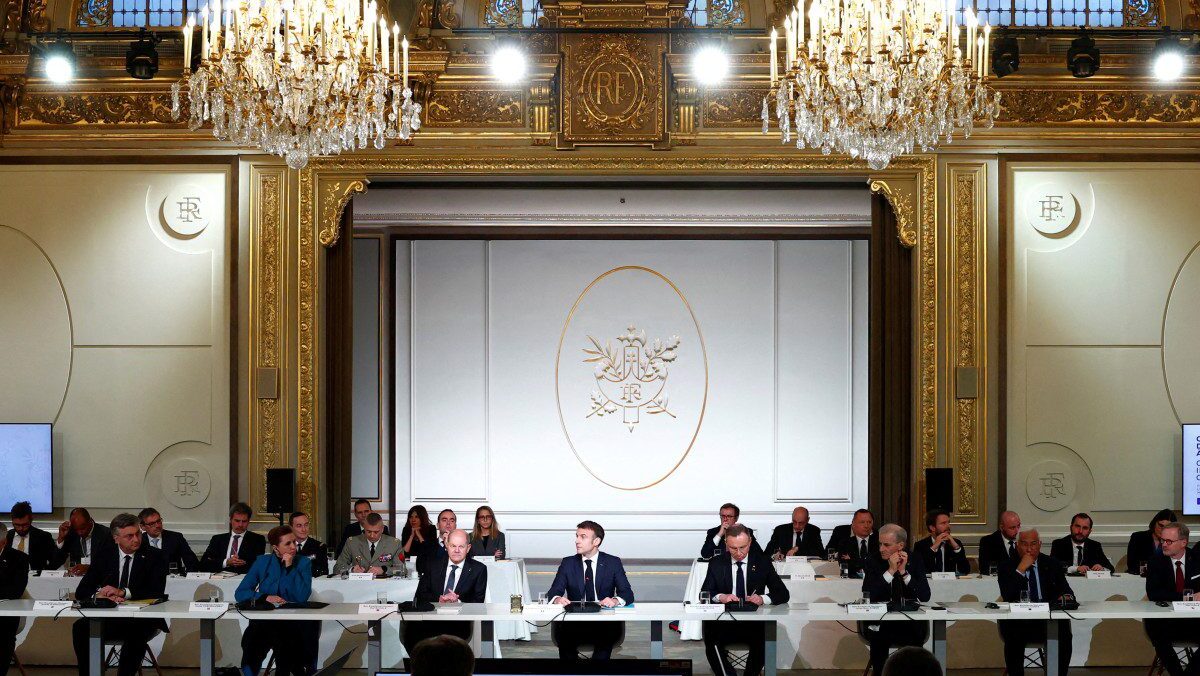
French President Emmanuel Macron (center) at the Paris summit in Elysée Palace, flanked by German Chancellor Olaf Scholz (left) and Polish President Andrzej Duda (right).
Photo: Gonzalo Fuentes / AFP
French President Emanuel Macron’s recent media stunt that was meant to make him the free world’s self-appointed military leader backfired spectacularly. Instead of backing his hawkish rhetoric, Western countries scrambled to deny involvement and distance themselves from Macron as quickly as possible.
As we also reported, Macron organized an ad-hoc summit in Paris on Monday to discuss how to increase support for Ukraine, after which he said that sending Western troops to the country “should not be ruled out” and even implied that at least a few other EU countries share this opinion.
Regardless of whether that is true or not, this part of the discussion was probably not meant to be spoken out loud. Russia immediately called his bluff and a Kremlin spokesman replied by saying that if any NATO country were to deploy its troops in Ukraine, even if only bilaterally, war with the entire alliance would be “inevitable.”
One by one, NATO leaders began to clear their names, primarily as a means to reassure their own citizens that they’ve got nothing to do with Macron’s plans, starting with the biggest members of the alliance apart from Macron’s France: the U.S., Britain, Germany, Poland, Spain, and Italy.
Commenting on Tuesday, German Chancellor Olaf Scholz—who was ridiculed by Macron a day before for being concerned about escalation—felt that it was important to speak in the name of the whole alliance. “There will be no ground troops, no soldiers on Ukrainian soil sent there by European countries or NATO states,” Scholz said firmly, while his defense minister Boris Pistorius also confirmed that troop deployment was “not an option” for Germany.
The White House was more permissive (with a Biden spokesman saying France is a sovereign country and can do as it wants), but made it clear that no U.S. troops will be sent to Ukraine either. “The only U.S. military personnel in Ukraine are associated with the embassy …The president’s been clear. There’s not going to be U.S. troops on the ground.”
British PM Rishi Sunak was also on the same page, saying that London hasn’t got “any plans for large-scale deployment” beyond the small number of support personnel already in the country. The Spanish and Italian governments were quick to reject the idea as well, and so was NATO Secretary-General Jens Stoltenberg.
Austrian Foreign Minister Michael Schallenberg said Macron’s suggestion was the “opposite” of the necessary “diplomatic perspective;” Finnish President Sauli Niinisto insisted on Helsinki’s “no military presence” policy; while Swedish PM Ulf Kristersson simply said that Macron can do whatever he wants but “French tradition is not the Swedish tradition.”
Macron’s statements also helped foster a surprising unity among the Visegrád countries, who haven’t been on the same page regarding any Ukraine-related issue since the beginning of the war. During their Prague summit on Tuesday, all four leaders of Poland, Czechia, Slovakia, and Hungary ruled out sending troops to Ukraine. Budapest and Bratislava—Europe’s two pro-peace governments—already made their positions clear on Monday evening, while Warsaw and Prague confirmed the same a day later.
The Baltic countries, on the other hand, were less decisive in their reactions. In fact, according to an unnamed diplomat familiar with the Paris talks, they were the ones most supportive of Macron’s rhetoric. Publically, Lithuanian Defense Minister Arvydas Anušauskas only said that sending NATO troops remains an option, “but not for combat operations,” while Estonian PM Kaja Kallas said that sending troops wasn’t even discussed in Paris: “Maybe this also got lost in translation.”
Naturally, Paris tried to remedy the embarrassing situation as much as possible. Clarifying Macron’s remarks, French Foreign Minister Stéphane Séjourné said the president was only referring to specific, non-combat-related tasks, such as mine clearance, cyber defense, and on-site weapons production. These might require the presence of military personnel in Ukraine, he added, but France would still avoid “crossing the threshold of fighting”—whatever that means.
